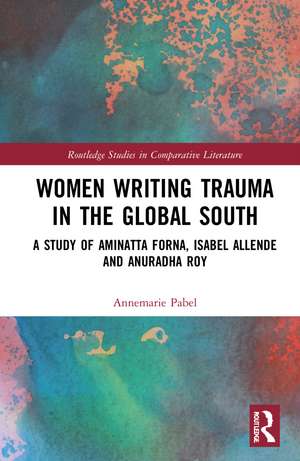Women Writing Trauma in the Global South: A Study of Aminatta Forna, Isabel Allende and Anuradha Roy: Routledge Studies in Comparative Literature
Autor Annemarie Pabelen Limba Engleză Hardback – 8 sep 2022
| Toate formatele și edițiile | Preț | Express |
|---|---|---|
| Paperback (1) | 361.96 lei 43-57 zile | |
| Taylor & Francis – 27 mai 2024 | 361.96 lei 43-57 zile | |
| Hardback (1) | 1158.84 lei 43-57 zile | |
| Taylor & Francis – 8 sep 2022 | 1158.84 lei 43-57 zile |
Din seria Routledge Studies in Comparative Literature
-
 Preț: 313.61 lei
Preț: 313.61 lei -
 Preț: 287.60 lei
Preț: 287.60 lei -
 Preț: 385.80 lei
Preț: 385.80 lei -
 Preț: 389.66 lei
Preț: 389.66 lei -
 Preț: 384.48 lei
Preț: 384.48 lei -
 Preț: 389.66 lei
Preț: 389.66 lei -
 Preț: 381.77 lei
Preț: 381.77 lei -
 Preț: 436.14 lei
Preț: 436.14 lei -
 Preț: 389.38 lei
Preț: 389.38 lei - 18%
 Preț: 1109.18 lei
Preț: 1109.18 lei -
 Preț: 389.66 lei
Preț: 389.66 lei - 5%
 Preț: 1163.16 lei
Preț: 1163.16 lei -
 Preț: 389.66 lei
Preț: 389.66 lei -
 Preț: 385.25 lei
Preț: 385.25 lei -
 Preț: 381.43 lei
Preț: 381.43 lei - 16%
 Preț: 130.21 lei
Preț: 130.21 lei -
 Preț: 383.30 lei
Preț: 383.30 lei - 18%
 Preț: 266.55 lei
Preț: 266.55 lei -
 Preț: 389.07 lei
Preț: 389.07 lei - 18%
 Preț: 1061.06 lei
Preț: 1061.06 lei - 18%
 Preț: 1005.94 lei
Preț: 1005.94 lei -
 Preț: 341.03 lei
Preț: 341.03 lei -
 Preț: 387.20 lei
Preț: 387.20 lei - 18%
 Preț: 1000.27 lei
Preț: 1000.27 lei - 17%
 Preț: 271.61 lei
Preț: 271.61 lei -
 Preț: 389.66 lei
Preț: 389.66 lei -
 Preț: 389.66 lei
Preț: 389.66 lei -
 Preț: 389.66 lei
Preț: 389.66 lei - 18%
 Preț: 1000.27 lei
Preț: 1000.27 lei
Preț: 1158.84 lei
Preț vechi: 1219.84 lei
-5% Nou
Puncte Express: 1738
Preț estimativ în valută:
221.75€ • 232.10$ • 184.56£
221.75€ • 232.10$ • 184.56£
Carte tipărită la comandă
Livrare economică 31 martie-14 aprilie
Preluare comenzi: 021 569.72.76
Specificații
ISBN-13: 9781032211176
ISBN-10: 1032211172
Pagini: 180
Dimensiuni: 152 x 229 x 11 mm
Greutate: 0.45 kg
Ediția:1
Editura: Taylor & Francis
Colecția Routledge
Seria Routledge Studies in Comparative Literature
Locul publicării:Oxford, United Kingdom
ISBN-10: 1032211172
Pagini: 180
Dimensiuni: 152 x 229 x 11 mm
Greutate: 0.45 kg
Ediția:1
Editura: Taylor & Francis
Colecția Routledge
Seria Routledge Studies in Comparative Literature
Locul publicării:Oxford, United Kingdom
Public țintă
PostgraduateNotă biografică
Annemarie Pabel is an independent researcher with a PhD in English literature. Her research interests include trauma studies and women’s writing.
Cuprins
Chapter One: Introduction - Concepts and Contexts of Psychological Wounding
Canonical Cultural Trauma Theory and Emerging Critical Perspectives
The Case for a Reconceptualization of Trauma
Wound Narratives from the Global South
Chapter Two: Aminatta Forna
Fictional Representations of Traumatic Disintegration in The Memory of Love
Prolonged and Insidious Trauma in The Devil that Danced on the Water
Narrative Critique of the PTSD Category in Happiness
Narrative Negotiations of a Context-specific Trauma Model
Complicated Witnessing in The Devil that Danced on the Water
Chapter Three: Isabel Allende
Writing during Trauma in Paula
Fictional Representations of Childhood Trauma in Portrait in Sepia
Inscriptions of Trauma in Landscape: Exile and Mental Dislocation
Resurfacing Wounds in Storytelling
Epistolary Narration in Articulating Bereavement
Magical Realist Elements in Representing the Unspeakable
Photography as a Testimonial Practice in Portrait in Sepia
Narrating ‘Belonging’ in My Invented Country
Chapter Four: Anuradha Roy
Fictional Representations of Prolonged Childhood Violence
Topographic and Architectural Manifestations of Traumatic Unhomeliness in An Atlas of Impossible Longing
Familial Disintegration and Unhomeliness
Self-Awareness and Transgression of Forms in Articulating Trauma
Epistolary Elements and Narrative Authority
Chapter Five Conclusion - Connecting Trauma Narratives in the Global South
Inscriptions of Complex Wounds
Towards Conceptual Inclusivity
Canonical Cultural Trauma Theory and Emerging Critical Perspectives
The Case for a Reconceptualization of Trauma
Wound Narratives from the Global South
Chapter Two: Aminatta Forna
Fictional Representations of Traumatic Disintegration in The Memory of Love
Prolonged and Insidious Trauma in The Devil that Danced on the Water
Narrative Critique of the PTSD Category in Happiness
Narrative Negotiations of a Context-specific Trauma Model
Complicated Witnessing in The Devil that Danced on the Water
- Unempathic Gazing and Professional Witnessing in Happiness
Chapter Three: Isabel Allende
Writing during Trauma in Paula
Fictional Representations of Childhood Trauma in Portrait in Sepia
Inscriptions of Trauma in Landscape: Exile and Mental Dislocation
Resurfacing Wounds in Storytelling
Epistolary Narration in Articulating Bereavement
Magical Realist Elements in Representing the Unspeakable
Photography as a Testimonial Practice in Portrait in Sepia
Narrating ‘Belonging’ in My Invented Country
Chapter Four: Anuradha Roy
Fictional Representations of Prolonged Childhood Violence
Topographic and Architectural Manifestations of Traumatic Unhomeliness in An Atlas of Impossible Longing
Familial Disintegration and Unhomeliness
Self-Awareness and Transgression of Forms in Articulating Trauma
Epistolary Elements and Narrative Authority
Chapter Five Conclusion - Connecting Trauma Narratives in the Global South
Inscriptions of Complex Wounds
Towards Conceptual Inclusivity
Descriere
Women Writing Trauma in the Global South explores complex suffering in the work of Aminatta Forna, Isabel Allende and Anuradha Roy while dismantling conceptual shortcomings underlying trauma theory. It develops new ideas for an inclusive conceptual expansion of trauma from the global peripheries.
